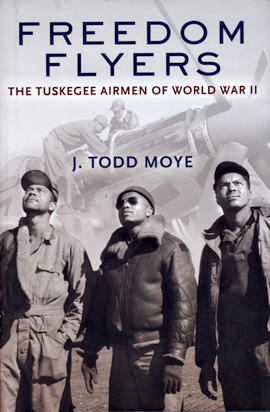The first book on the Tuskegee Airmen to draw from an extensive interview project will be the subject of the author’s talk at UT Dallas on Tuesday, March 20.

UNT Professor J. Todd Moye headed the oral history project.
University of North Texas history Professor J. Todd Moye, director of the UNT Oral History Program, will discuss Freedom Flyers: The Tuskegee Airmen of World War II as a guest of McDermott Library Special Collections and the History of Aviation Collection.
The event is free and open to the public. It will include a book signing with Freedom Flyers being available from the UT Dallas Bookstore at the lecture.
A scholarly history and also social history, Freedom Flyers is a finalist for the Benjamin L. Hooks Institute Book Award. It is the first book to make use of the 800-plus interviews recorded for the National Park Service’s Tuskegee Airmen Oral History Project, which Moye directed from 2000 to 2005.
In advance of his lecture, Dr. Moye answered questions about his book and related topics.
As a historian, you already knew the basics behind the story of the Tuskegee Airmen. What revelation was the most astonishing as you went through the project interviews?
One of the beauties of a large oral history project like the National Park Service’s Tuskegee Airmen Oral History Project (which I directed, and whose materials comprise the foundation of my book) is that it captures so many different perspectives on a single experience. So, for instance, when the project’s interviewers and I asked Tuskegee Airmen why they had volunteered for service during the war, we initially expected answers that fell into the traditional “Double Victory” narrative – they wanted to defeat fascism abroad and racism at home.
Certainly many of the interviewees’ answers fed into that traditional narrative, but many did not. I found it fascinating that so many men told us candidly that they could have cared less about the civil rights aspect of their service – they just wanted the chance to fly airplanes, and this program finally offered the opportunity. In Freedom Flyers, I tried to portray the complicated motives the men had for going to war by using their own words.

What is the leading aspect of your book that has not been seen in any of the previous studies of the Tuskegee Airmen?
A – “Freedom Flyers” is one of the few academic studies of the Tuskegee Airmen experience, one of even fewer to interpret the Tuskegee Airmen’s experience beyond combat, and it is the only one (so far) to take advantage of the 800+ oral histories recorded for the National Park Service project.
I combined my research in all of the major archives with materials from the oral histories, and tried to tell the story in a way that would be accessible to both academic historians and people outside of academia.
The recent film Red Tails gave a Hollywood glimpse at the Tuskegee fliers. What are some of the misconceptions presented in the movie that you know are factually inaccurate?
George Lucas and other filmmakers obviously play by different rules than academic historians do, and I’ll grant him a wide berth for poetic license. Red Tails gets most of the history of the experience right, at least in broad strokes, and he consulted with dozens of original Tuskegee Airmen in making the movie, so I don’t have too many quibbles with him on that score. But according to Lucas himself, he set out to make a movie that was “jingoistic” and “cheesy” – these are descriptions he offered in the p.r. blitz that led to the movie’s release.
That’s not the movie I would have set out to make, and I hope it won’t be Hollywood’s last treatment of the experience, because I think there is room for improvement. But having said that, the original Tuskegee Airmen themselves seem to love the movie, and we all appreciate the amount of attention it has brought them. I give Lucas a lot of credit for that.
Were you more impressed with the valor in combat of the Tuskegee Airmen or with their determination to overcome the racism that surrounded their war activities?
My training is as a civil rights historian, as opposed to a military historian. I was predisposed to concentrate on the fight against discrimination and segregation in this story, and I remain so. But the combat record is unimpeachable.
Despite the revelation that the Tuskegee Airmen’s “never lost a bomber” claim turns out to be false (through no fault of their own, I hasten to add), their record was better than the majority of their white counterparts’. Nobody can take that away from them.